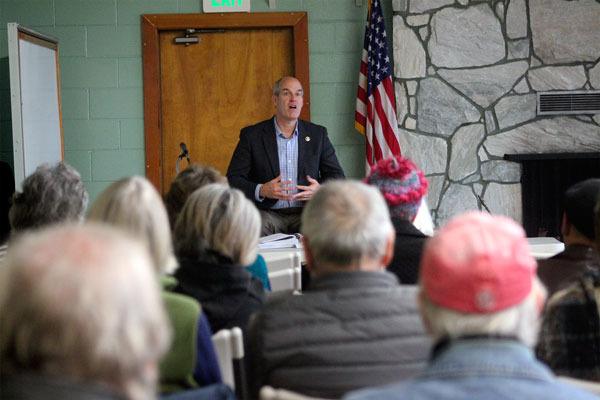Protecting American jobs and the planet’s environment were some of the top concerns voiced at a town hall meeting in Clinton on Saturday.
Hosted by Congressman Rick Larsen, the meeting was one of a series the 2nd district Democrat organized around the Trans-Pacific Partnership. Larsen said the 2,225-page deal includes a dozen Pacific Rim countries and is championed as a boon to industry and the environment. Critics of the trade agreement say it suffers from a litany of shortcomings, from failing to address specific labor standards to a lack of guarantees that jobs won’t be lost overseas.
Citing arguments from the White House about the deal, Larsen said improved labor conditions abroad, environmental protections and regulations, economic gains, and the strategic value of economic influence in nations around China are reasons to support the agreement.
“These town halls are like crowdfunding my research,” said Larsen, who earlier noted he had not read the entire document as it was only released in its final draft form Nov. 5.
Whidbey Island people were less enthused than President Barack Obama and the deal’s supporters. Larsen spent most of the two hour-session fielding questions from a crowd that swelled to more than 50 people. Some of the consistent concerns centered on how the trade agreement would impact U.S. employment and the global ecosystem.
One speaker, who identified himself as a Freeland resident, criticized the entire deal on the basis that it was created without congressional oversight.
Lynne Dodson, secretary-treasurer of the Washington State Labor Council, asked what “corporate social responsibility” meant in the 2,225-page document, and how it would be enforced. Larsen said he was not going to read that particular section because of that very language.
Dodson also requested that Larsen demand the inclusion of minimal labor standards as part of the deal. The requirement for the TPP nations, including some routinely criticized for poor working conditions, child labor and de facto slave labor, is to create labor laws that would define a minimum wage and a standard work week, though no target numbers are included.
Amendments to the Trans-Pacific Partnership, however, are not possible.
Trade promotion authority was granted to Obama earlier this year, paving the way for his administration to fast track the sweeping trade deal. It also means that Congress will only get a yes/no vote, and cannot amend it. Larsen voted in favor of granting trade promotion authority, and said he still supported the president’s authority to craft trade negotiations.
“The idea you’ll get 435 members of Congress individually negotiating a trade contract is, quite frankly, ridiculous,” he said.
Wolf Clifton of Clinton questioned Larsen about the environmental chapter. He cited a paragraph that detailed how governments cannot “disguise” environmental law as a trade barrier, and asked if it was a corporate loophole to deregulate protections.
Larsen said he disagreed with the premise that it would allow companies to sidestep environmental laws.
One of the recurring questions was about the use of a tribunal and its potential for superseding domestic laws. Basically, people wondered if tribunal decisions cast in favor of companies would supplant laws in the United States and potentially undo environmental regulation.
Larsen adamantly rebuffed the worry. The U.S. Constitution, he said, is the law of the land, and the Supreme Court has fought vehemently and will continue to defend the document’s authority. Not only that, but Larsen said the Trans-Pacific Partnership would not revoke the country’s legislative and executive branches’ authority.
“There’s nothing in this that lets us, Congress and the president, give up our ability to change trade laws,” he said.
“You can’t force a country to change its laws based on ISDS (investor-state dispute settlement),” Larsen added.
Holding the town halls was a way for Larsen to add more voices to his own, and to see what constituents in the 2nd Congressional District. But he also said they were not ways for him to tally votes to make his decision, citing his past experience with town hall meetings about the Affordable Care Act when most of the crowds wanted him to vote down the health care bill. He voted in favor of the bill, which passed and has markedly decreased the uninsured rate in the state and country, he said.



